Evaluating a Sports-Specific Diet: Nutrition and Diet Analysis
VerifiedAdded on 2023/06/09
|13
|3438
|55
Report
AI Summary
This document presents a comprehensive nutrition and diet analysis focusing on modifying a high-fat diet to suit the athletic requirements of a basketball player. It includes a 24-hour diet recall, a five-day diet record, a food frequency questionnaire, and a diet history, evaluating the results against New Zealand's recommended dietary status. The report details the modification of the individual's diet, providing a three-day sports-specific diet plan and analyzing its impact. It also discusses the challenges and motivations in adhering to the restricted diet, highlighting the importance of supplements and the principles of a sports-specific diet for aspiring athletes, with a final recommendation for maintaining a balanced intake of carbohydrates, protein, vitamins, and minerals to optimize energy and performance.
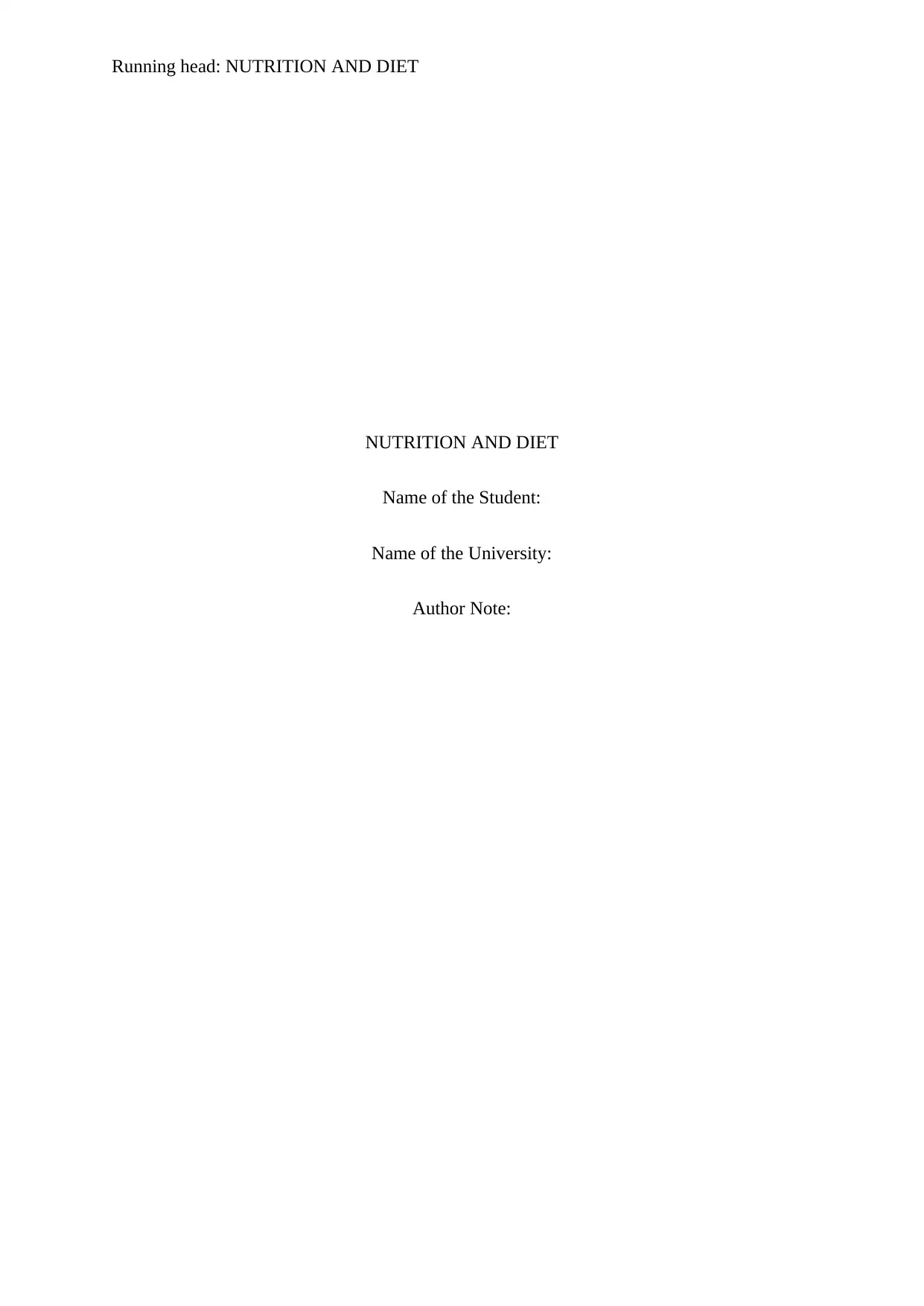
Running head: NUTRITION AND DIET
NUTRITION AND DIET
Name of the Student:
Name of the University:
Author Note:
NUTRITION AND DIET
Name of the Student:
Name of the University:
Author Note:
Paraphrase This Document
Need a fresh take? Get an instant paraphrase of this document with our AI Paraphraser
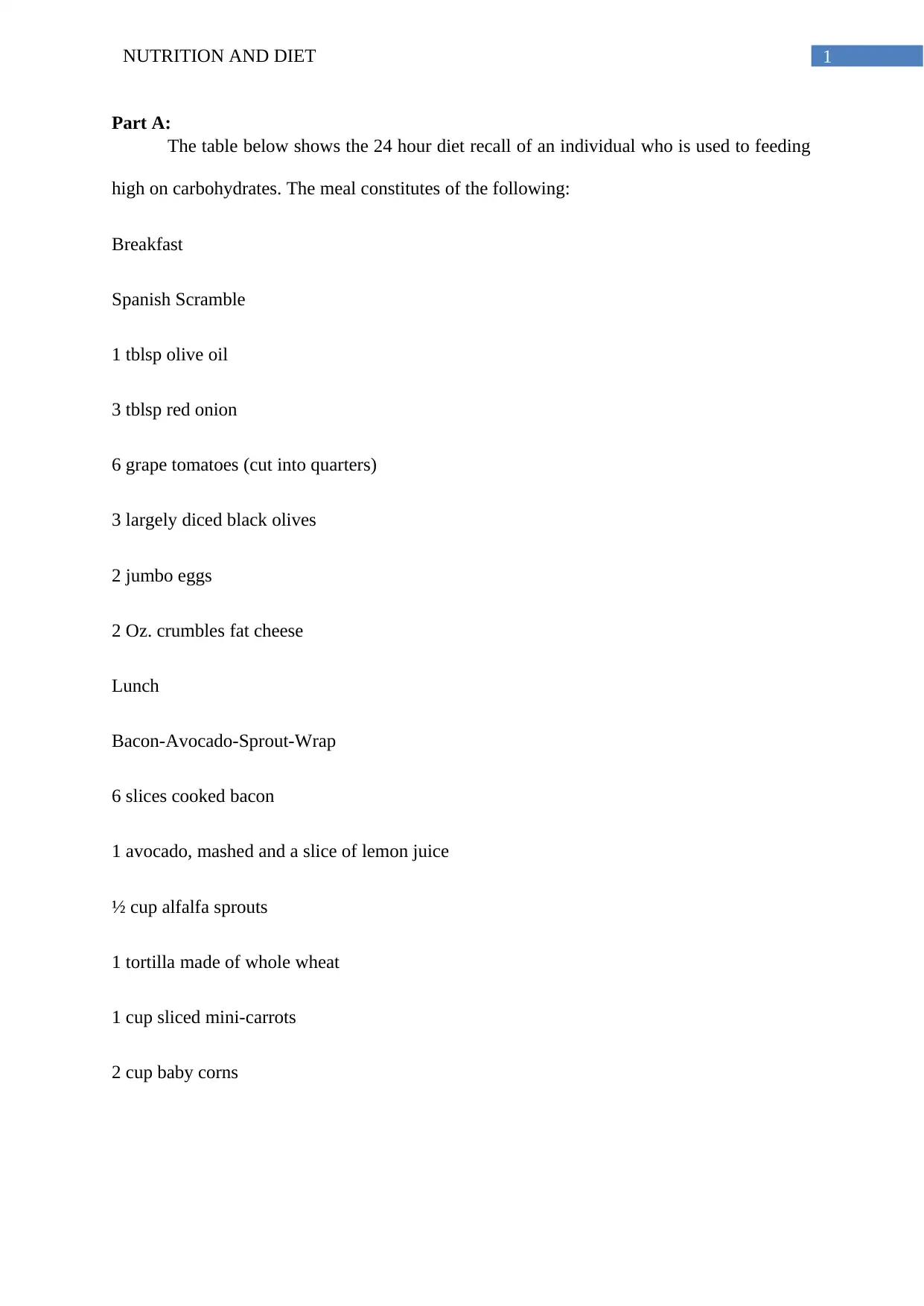
1NUTRITION AND DIET
Part A:
The table below shows the 24 hour diet recall of an individual who is used to feeding
high on carbohydrates. The meal constitutes of the following:
Breakfast
Spanish Scramble
1 tblsp olive oil
3 tblsp red onion
6 grape tomatoes (cut into quarters)
3 largely diced black olives
2 jumbo eggs
2 Oz. crumbles fat cheese
Lunch
Bacon-Avocado-Sprout-Wrap
6 slices cooked bacon
1 avocado, mashed and a slice of lemon juice
½ cup alfalfa sprouts
1 tortilla made of whole wheat
1 cup sliced mini-carrots
2 cup baby corns
Part A:
The table below shows the 24 hour diet recall of an individual who is used to feeding
high on carbohydrates. The meal constitutes of the following:
Breakfast
Spanish Scramble
1 tblsp olive oil
3 tblsp red onion
6 grape tomatoes (cut into quarters)
3 largely diced black olives
2 jumbo eggs
2 Oz. crumbles fat cheese
Lunch
Bacon-Avocado-Sprout-Wrap
6 slices cooked bacon
1 avocado, mashed and a slice of lemon juice
½ cup alfalfa sprouts
1 tortilla made of whole wheat
1 cup sliced mini-carrots
2 cup baby corns
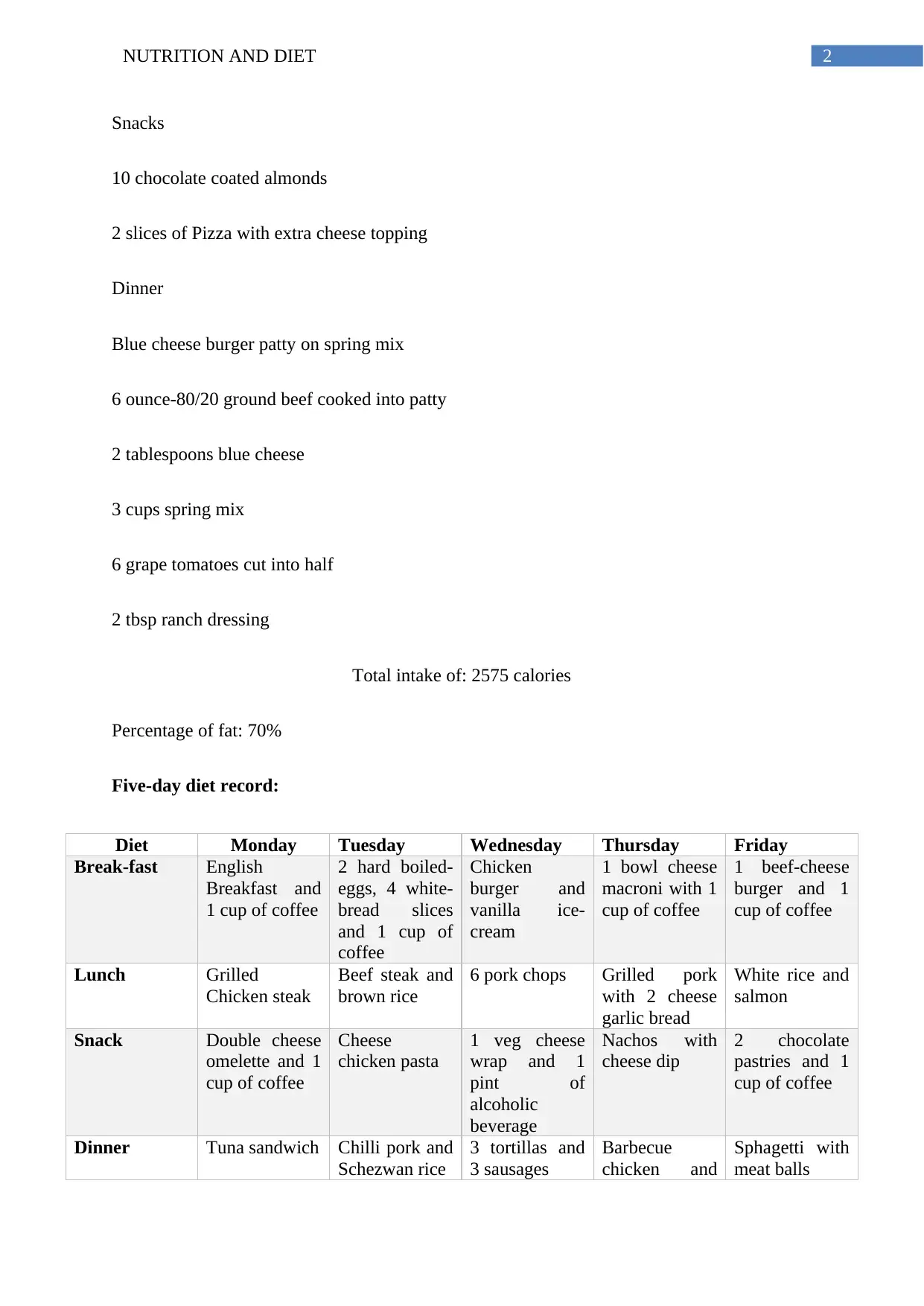
2NUTRITION AND DIET
Snacks
10 chocolate coated almonds
2 slices of Pizza with extra cheese topping
Dinner
Blue cheese burger patty on spring mix
6 ounce-80/20 ground beef cooked into patty
2 tablespoons blue cheese
3 cups spring mix
6 grape tomatoes cut into half
2 tbsp ranch dressing
Total intake of: 2575 calories
Percentage of fat: 70%
Five-day diet record:
Diet Monday Tuesday Wednesday Thursday Friday
Break-fast English
Breakfast and
1 cup of coffee
2 hard boiled-
eggs, 4 white-
bread slices
and 1 cup of
coffee
Chicken
burger and
vanilla ice-
cream
1 bowl cheese
macroni with 1
cup of coffee
1 beef-cheese
burger and 1
cup of coffee
Lunch Grilled
Chicken steak
Beef steak and
brown rice
6 pork chops Grilled pork
with 2 cheese
garlic bread
White rice and
salmon
Snack Double cheese
omelette and 1
cup of coffee
Cheese
chicken pasta
1 veg cheese
wrap and 1
pint of
alcoholic
beverage
Nachos with
cheese dip
2 chocolate
pastries and 1
cup of coffee
Dinner Tuna sandwich Chilli pork and
Schezwan rice
3 tortillas and
3 sausages
Barbecue
chicken and
Sphagetti with
meat balls
Snacks
10 chocolate coated almonds
2 slices of Pizza with extra cheese topping
Dinner
Blue cheese burger patty on spring mix
6 ounce-80/20 ground beef cooked into patty
2 tablespoons blue cheese
3 cups spring mix
6 grape tomatoes cut into half
2 tbsp ranch dressing
Total intake of: 2575 calories
Percentage of fat: 70%
Five-day diet record:
Diet Monday Tuesday Wednesday Thursday Friday
Break-fast English
Breakfast and
1 cup of coffee
2 hard boiled-
eggs, 4 white-
bread slices
and 1 cup of
coffee
Chicken
burger and
vanilla ice-
cream
1 bowl cheese
macroni with 1
cup of coffee
1 beef-cheese
burger and 1
cup of coffee
Lunch Grilled
Chicken steak
Beef steak and
brown rice
6 pork chops Grilled pork
with 2 cheese
garlic bread
White rice and
salmon
Snack Double cheese
omelette and 1
cup of coffee
Cheese
chicken pasta
1 veg cheese
wrap and 1
pint of
alcoholic
beverage
Nachos with
cheese dip
2 chocolate
pastries and 1
cup of coffee
Dinner Tuna sandwich Chilli pork and
Schezwan rice
3 tortillas and
3 sausages
Barbecue
chicken and
Sphagetti with
meat balls
⊘ This is a preview!⊘
Do you want full access?
Subscribe today to unlock all pages.

Trusted by 1+ million students worldwide
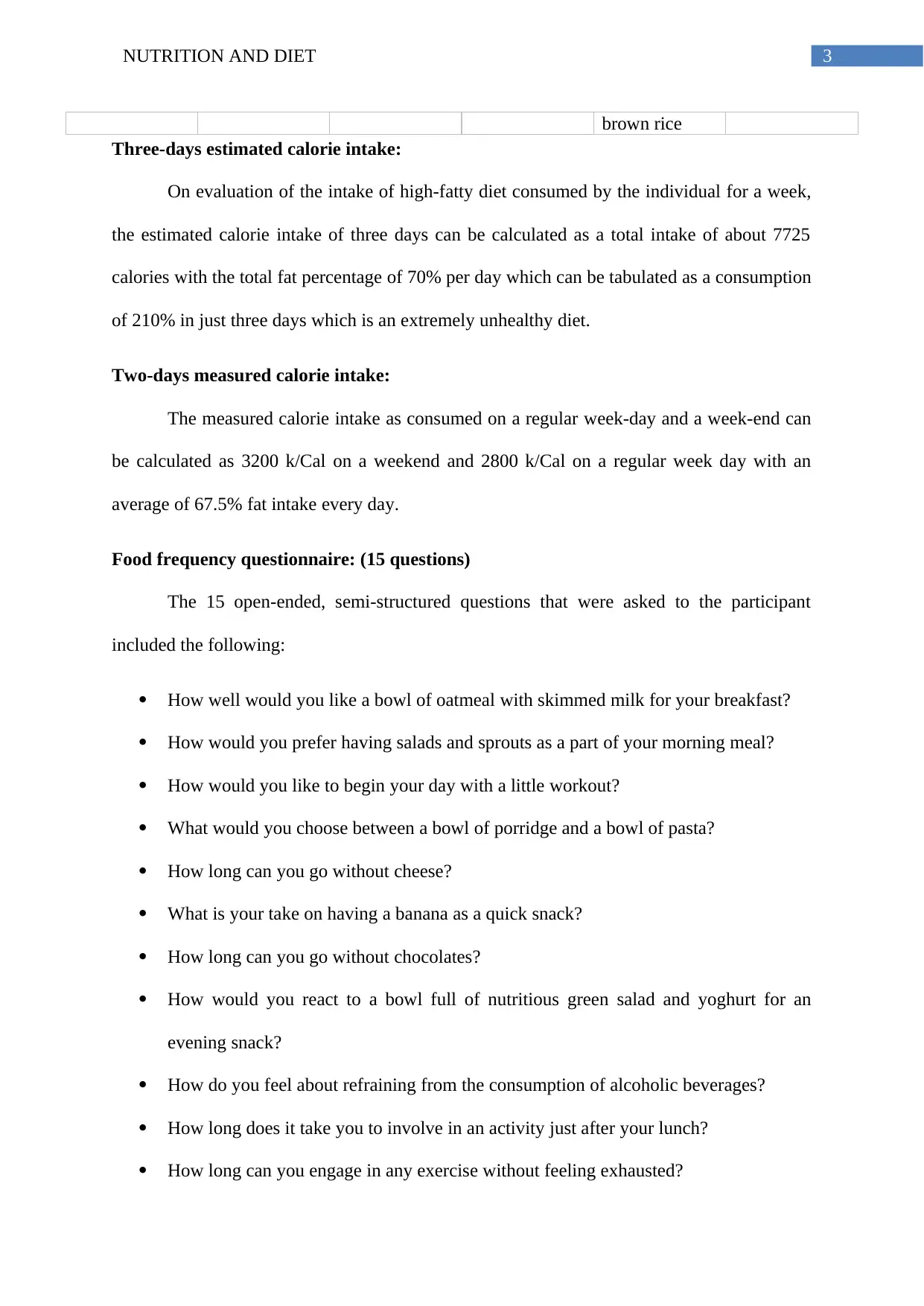
3NUTRITION AND DIET
brown rice
Three-days estimated calorie intake:
On evaluation of the intake of high-fatty diet consumed by the individual for a week,
the estimated calorie intake of three days can be calculated as a total intake of about 7725
calories with the total fat percentage of 70% per day which can be tabulated as a consumption
of 210% in just three days which is an extremely unhealthy diet.
Two-days measured calorie intake:
The measured calorie intake as consumed on a regular week-day and a week-end can
be calculated as 3200 k/Cal on a weekend and 2800 k/Cal on a regular week day with an
average of 67.5% fat intake every day.
Food frequency questionnaire: (15 questions)
The 15 open-ended, semi-structured questions that were asked to the participant
included the following:
How well would you like a bowl of oatmeal with skimmed milk for your breakfast?
How would you prefer having salads and sprouts as a part of your morning meal?
How would you like to begin your day with a little workout?
What would you choose between a bowl of porridge and a bowl of pasta?
How long can you go without cheese?
What is your take on having a banana as a quick snack?
How long can you go without chocolates?
How would you react to a bowl full of nutritious green salad and yoghurt for an
evening snack?
How do you feel about refraining from the consumption of alcoholic beverages?
How long does it take you to involve in an activity just after your lunch?
How long can you engage in any exercise without feeling exhausted?
brown rice
Three-days estimated calorie intake:
On evaluation of the intake of high-fatty diet consumed by the individual for a week,
the estimated calorie intake of three days can be calculated as a total intake of about 7725
calories with the total fat percentage of 70% per day which can be tabulated as a consumption
of 210% in just three days which is an extremely unhealthy diet.
Two-days measured calorie intake:
The measured calorie intake as consumed on a regular week-day and a week-end can
be calculated as 3200 k/Cal on a weekend and 2800 k/Cal on a regular week day with an
average of 67.5% fat intake every day.
Food frequency questionnaire: (15 questions)
The 15 open-ended, semi-structured questions that were asked to the participant
included the following:
How well would you like a bowl of oatmeal with skimmed milk for your breakfast?
How would you prefer having salads and sprouts as a part of your morning meal?
How would you like to begin your day with a little workout?
What would you choose between a bowl of porridge and a bowl of pasta?
How long can you go without cheese?
What is your take on having a banana as a quick snack?
How long can you go without chocolates?
How would you react to a bowl full of nutritious green salad and yoghurt for an
evening snack?
How do you feel about refraining from the consumption of alcoholic beverages?
How long does it take you to involve in an activity just after your lunch?
How long can you engage in any exercise without feeling exhausted?
Paraphrase This Document
Need a fresh take? Get an instant paraphrase of this document with our AI Paraphraser
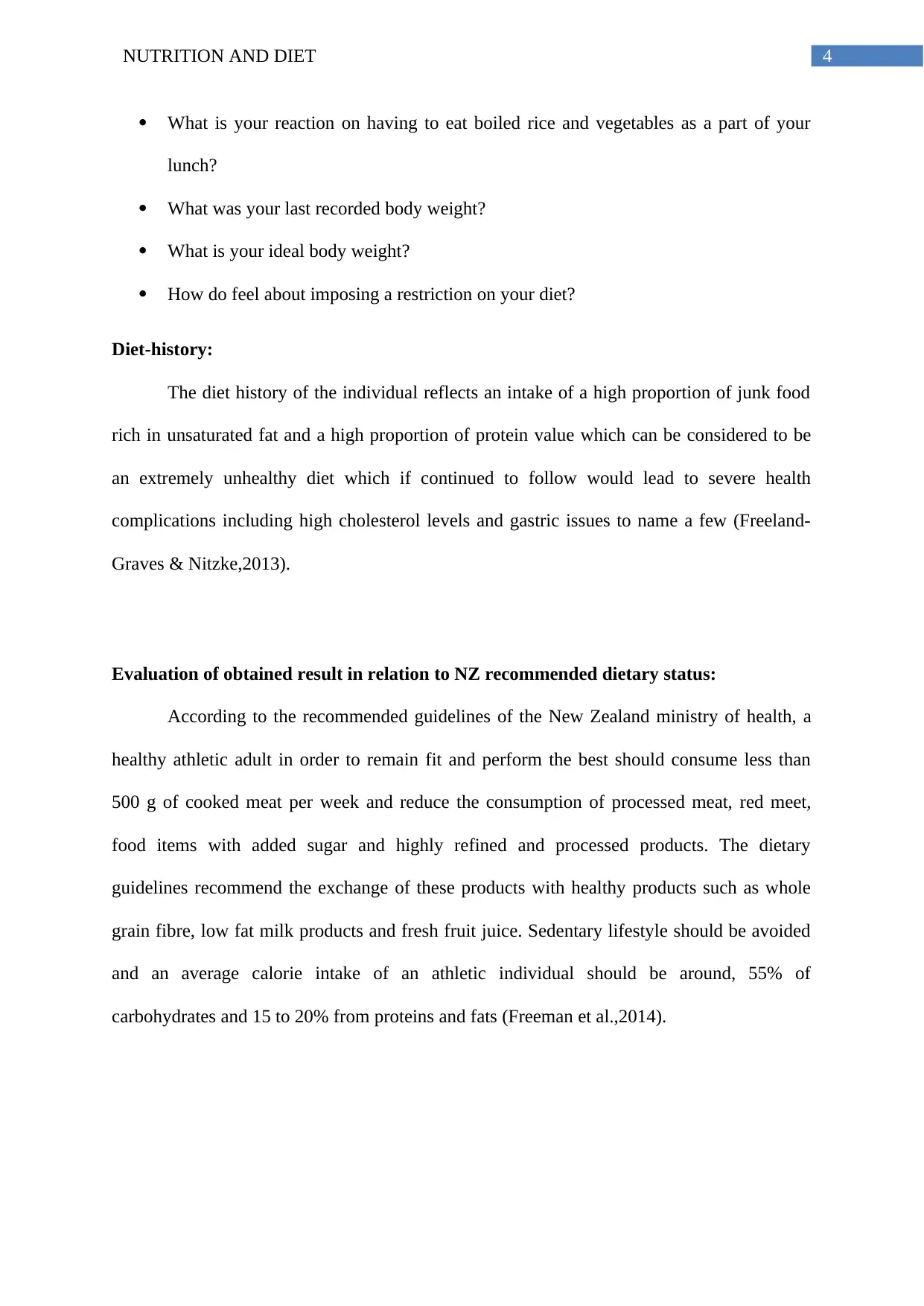
4NUTRITION AND DIET
What is your reaction on having to eat boiled rice and vegetables as a part of your
lunch?
What was your last recorded body weight?
What is your ideal body weight?
How do feel about imposing a restriction on your diet?
Diet-history:
The diet history of the individual reflects an intake of a high proportion of junk food
rich in unsaturated fat and a high proportion of protein value which can be considered to be
an extremely unhealthy diet which if continued to follow would lead to severe health
complications including high cholesterol levels and gastric issues to name a few (Freeland-
Graves & Nitzke,2013).
Evaluation of obtained result in relation to NZ recommended dietary status:
According to the recommended guidelines of the New Zealand ministry of health, a
healthy athletic adult in order to remain fit and perform the best should consume less than
500 g of cooked meat per week and reduce the consumption of processed meat, red meet,
food items with added sugar and highly refined and processed products. The dietary
guidelines recommend the exchange of these products with healthy products such as whole
grain fibre, low fat milk products and fresh fruit juice. Sedentary lifestyle should be avoided
and an average calorie intake of an athletic individual should be around, 55% of
carbohydrates and 15 to 20% from proteins and fats (Freeman et al.,2014).
What is your reaction on having to eat boiled rice and vegetables as a part of your
lunch?
What was your last recorded body weight?
What is your ideal body weight?
How do feel about imposing a restriction on your diet?
Diet-history:
The diet history of the individual reflects an intake of a high proportion of junk food
rich in unsaturated fat and a high proportion of protein value which can be considered to be
an extremely unhealthy diet which if continued to follow would lead to severe health
complications including high cholesterol levels and gastric issues to name a few (Freeland-
Graves & Nitzke,2013).
Evaluation of obtained result in relation to NZ recommended dietary status:
According to the recommended guidelines of the New Zealand ministry of health, a
healthy athletic adult in order to remain fit and perform the best should consume less than
500 g of cooked meat per week and reduce the consumption of processed meat, red meet,
food items with added sugar and highly refined and processed products. The dietary
guidelines recommend the exchange of these products with healthy products such as whole
grain fibre, low fat milk products and fresh fruit juice. Sedentary lifestyle should be avoided
and an average calorie intake of an athletic individual should be around, 55% of
carbohydrates and 15 to 20% from proteins and fats (Freeman et al.,2014).
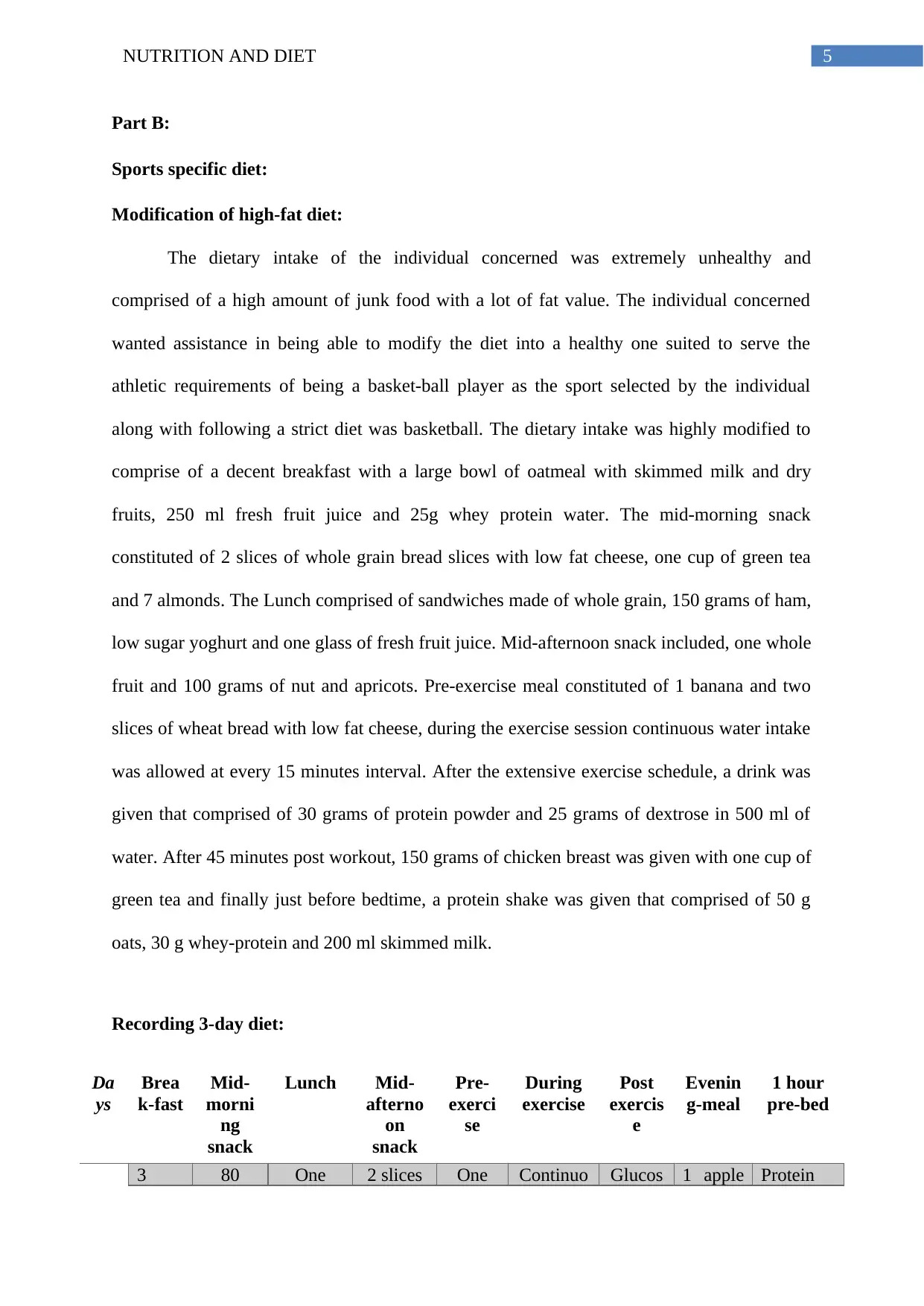
5NUTRITION AND DIET
Part B:
Sports specific diet:
Modification of high-fat diet:
The dietary intake of the individual concerned was extremely unhealthy and
comprised of a high amount of junk food with a lot of fat value. The individual concerned
wanted assistance in being able to modify the diet into a healthy one suited to serve the
athletic requirements of being a basket-ball player as the sport selected by the individual
along with following a strict diet was basketball. The dietary intake was highly modified to
comprise of a decent breakfast with a large bowl of oatmeal with skimmed milk and dry
fruits, 250 ml fresh fruit juice and 25g whey protein water. The mid-morning snack
constituted of 2 slices of whole grain bread slices with low fat cheese, one cup of green tea
and 7 almonds. The Lunch comprised of sandwiches made of whole grain, 150 grams of ham,
low sugar yoghurt and one glass of fresh fruit juice. Mid-afternoon snack included, one whole
fruit and 100 grams of nut and apricots. Pre-exercise meal constituted of 1 banana and two
slices of wheat bread with low fat cheese, during the exercise session continuous water intake
was allowed at every 15 minutes interval. After the extensive exercise schedule, a drink was
given that comprised of 30 grams of protein powder and 25 grams of dextrose in 500 ml of
water. After 45 minutes post workout, 150 grams of chicken breast was given with one cup of
green tea and finally just before bedtime, a protein shake was given that comprised of 50 g
oats, 30 g whey-protein and 200 ml skimmed milk.
Recording 3-day diet:
Da
ys
Brea
k-fast
Mid-
morni
ng
snack
Lunch Mid-
afterno
on
snack
Pre-
exerci
se
During
exercise
Post
exercis
e
Evenin
g-meal
1 hour
pre-bed
3 80 One 2 slices One Continuo Glucos 1 apple Protein
Part B:
Sports specific diet:
Modification of high-fat diet:
The dietary intake of the individual concerned was extremely unhealthy and
comprised of a high amount of junk food with a lot of fat value. The individual concerned
wanted assistance in being able to modify the diet into a healthy one suited to serve the
athletic requirements of being a basket-ball player as the sport selected by the individual
along with following a strict diet was basketball. The dietary intake was highly modified to
comprise of a decent breakfast with a large bowl of oatmeal with skimmed milk and dry
fruits, 250 ml fresh fruit juice and 25g whey protein water. The mid-morning snack
constituted of 2 slices of whole grain bread slices with low fat cheese, one cup of green tea
and 7 almonds. The Lunch comprised of sandwiches made of whole grain, 150 grams of ham,
low sugar yoghurt and one glass of fresh fruit juice. Mid-afternoon snack included, one whole
fruit and 100 grams of nut and apricots. Pre-exercise meal constituted of 1 banana and two
slices of wheat bread with low fat cheese, during the exercise session continuous water intake
was allowed at every 15 minutes interval. After the extensive exercise schedule, a drink was
given that comprised of 30 grams of protein powder and 25 grams of dextrose in 500 ml of
water. After 45 minutes post workout, 150 grams of chicken breast was given with one cup of
green tea and finally just before bedtime, a protein shake was given that comprised of 50 g
oats, 30 g whey-protein and 200 ml skimmed milk.
Recording 3-day diet:
Da
ys
Brea
k-fast
Mid-
morni
ng
snack
Lunch Mid-
afterno
on
snack
Pre-
exerci
se
During
exercise
Post
exercis
e
Evenin
g-meal
1 hour
pre-bed
3 80 One 2 slices One Continuo Glucos 1 apple Protein
⊘ This is a preview!⊘
Do you want full access?
Subscribe today to unlock all pages.

Trusted by 1+ million students worldwide
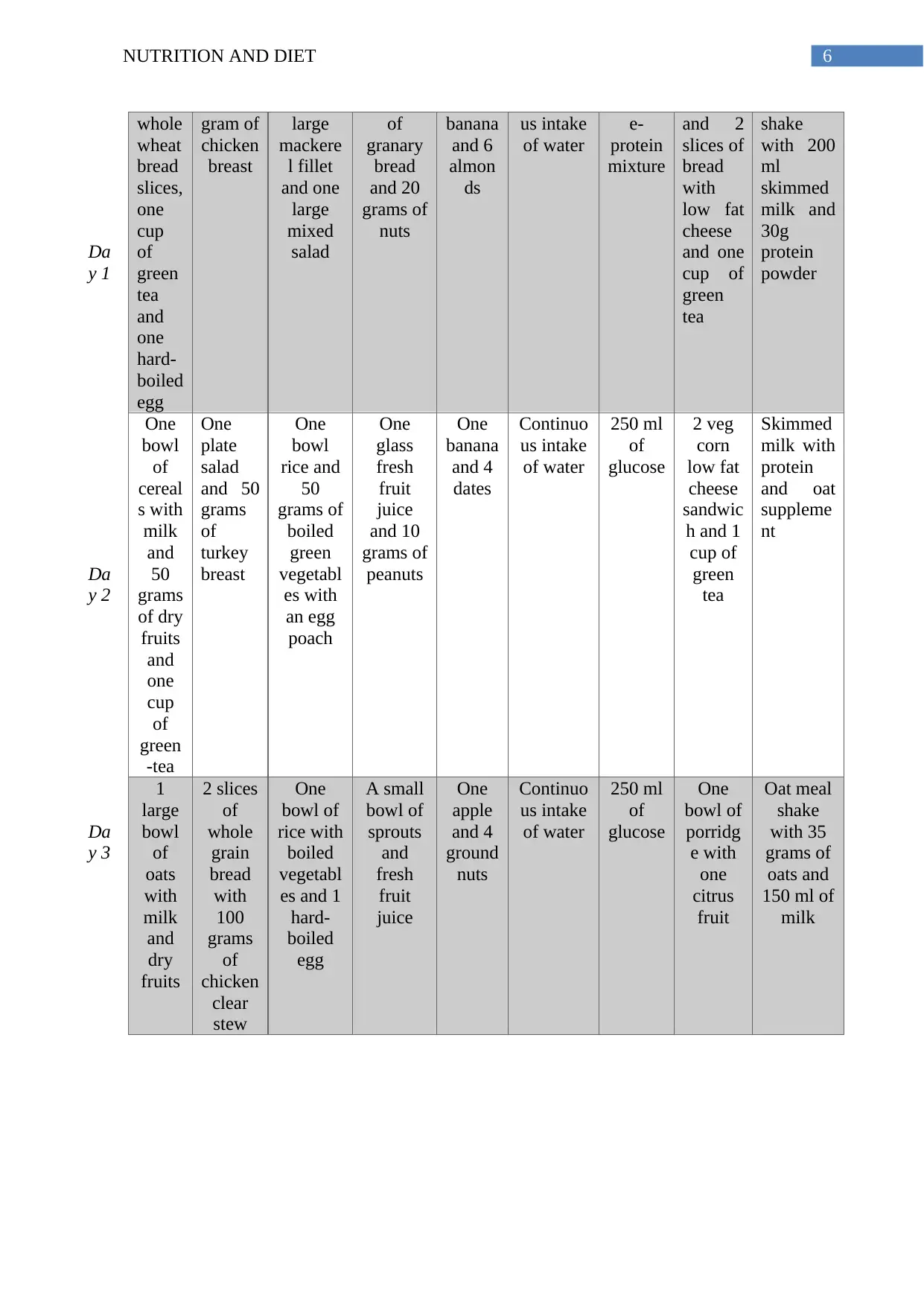
6NUTRITION AND DIET
Da
y 1
whole
wheat
bread
slices,
one
cup
of
green
tea
and
one
hard-
boiled
egg
gram of
chicken
breast
large
mackere
l fillet
and one
large
mixed
salad
of
granary
bread
and 20
grams of
nuts
banana
and 6
almon
ds
us intake
of water
e-
protein
mixture
and 2
slices of
bread
with
low fat
cheese
and one
cup of
green
tea
shake
with 200
ml
skimmed
milk and
30g
protein
powder
Da
y 2
One
bowl
of
cereal
s with
milk
and
50
grams
of dry
fruits
and
one
cup
of
green
-tea
One
plate
salad
and 50
grams
of
turkey
breast
One
bowl
rice and
50
grams of
boiled
green
vegetabl
es with
an egg
poach
One
glass
fresh
fruit
juice
and 10
grams of
peanuts
One
banana
and 4
dates
Continuo
us intake
of water
250 ml
of
glucose
2 veg
corn
low fat
cheese
sandwic
h and 1
cup of
green
tea
Skimmed
milk with
protein
and oat
suppleme
nt
Da
y 3
1
large
bowl
of
oats
with
milk
and
dry
fruits
2 slices
of
whole
grain
bread
with
100
grams
of
chicken
clear
stew
One
bowl of
rice with
boiled
vegetabl
es and 1
hard-
boiled
egg
A small
bowl of
sprouts
and
fresh
fruit
juice
One
apple
and 4
ground
nuts
Continuo
us intake
of water
250 ml
of
glucose
One
bowl of
porridg
e with
one
citrus
fruit
Oat meal
shake
with 35
grams of
oats and
150 ml of
milk
Da
y 1
whole
wheat
bread
slices,
one
cup
of
green
tea
and
one
hard-
boiled
egg
gram of
chicken
breast
large
mackere
l fillet
and one
large
mixed
salad
of
granary
bread
and 20
grams of
nuts
banana
and 6
almon
ds
us intake
of water
e-
protein
mixture
and 2
slices of
bread
with
low fat
cheese
and one
cup of
green
tea
shake
with 200
ml
skimmed
milk and
30g
protein
powder
Da
y 2
One
bowl
of
cereal
s with
milk
and
50
grams
of dry
fruits
and
one
cup
of
green
-tea
One
plate
salad
and 50
grams
of
turkey
breast
One
bowl
rice and
50
grams of
boiled
green
vegetabl
es with
an egg
poach
One
glass
fresh
fruit
juice
and 10
grams of
peanuts
One
banana
and 4
dates
Continuo
us intake
of water
250 ml
of
glucose
2 veg
corn
low fat
cheese
sandwic
h and 1
cup of
green
tea
Skimmed
milk with
protein
and oat
suppleme
nt
Da
y 3
1
large
bowl
of
oats
with
milk
and
dry
fruits
2 slices
of
whole
grain
bread
with
100
grams
of
chicken
clear
stew
One
bowl of
rice with
boiled
vegetabl
es and 1
hard-
boiled
egg
A small
bowl of
sprouts
and
fresh
fruit
juice
One
apple
and 4
ground
nuts
Continuo
us intake
of water
250 ml
of
glucose
One
bowl of
porridg
e with
one
citrus
fruit
Oat meal
shake
with 35
grams of
oats and
150 ml of
milk
Paraphrase This Document
Need a fresh take? Get an instant paraphrase of this document with our AI Paraphraser
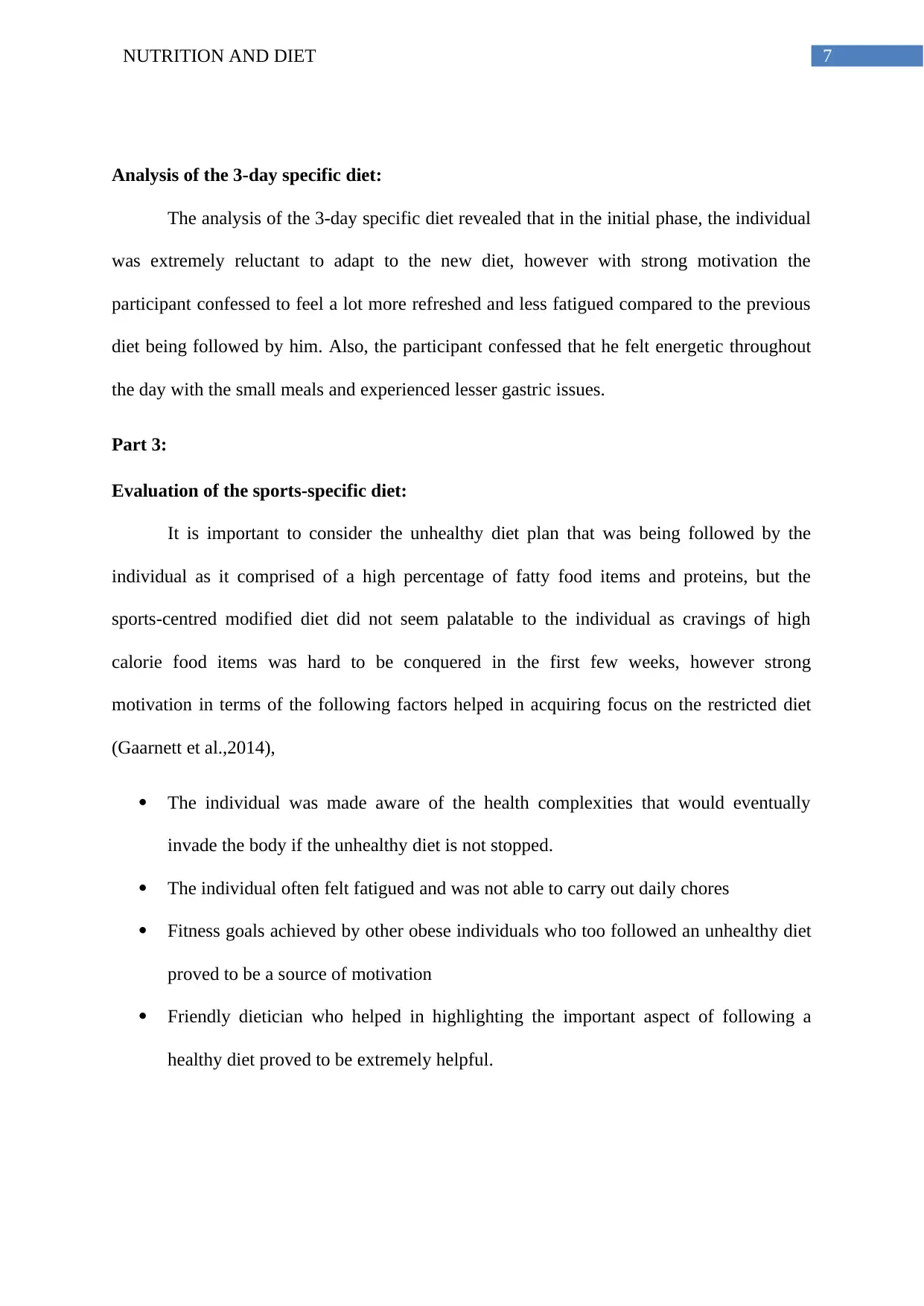
7NUTRITION AND DIET
Analysis of the 3-day specific diet:
The analysis of the 3-day specific diet revealed that in the initial phase, the individual
was extremely reluctant to adapt to the new diet, however with strong motivation the
participant confessed to feel a lot more refreshed and less fatigued compared to the previous
diet being followed by him. Also, the participant confessed that he felt energetic throughout
the day with the small meals and experienced lesser gastric issues.
Part 3:
Evaluation of the sports-specific diet:
It is important to consider the unhealthy diet plan that was being followed by the
individual as it comprised of a high percentage of fatty food items and proteins, but the
sports-centred modified diet did not seem palatable to the individual as cravings of high
calorie food items was hard to be conquered in the first few weeks, however strong
motivation in terms of the following factors helped in acquiring focus on the restricted diet
(Gaarnett et al.,2014),
The individual was made aware of the health complexities that would eventually
invade the body if the unhealthy diet is not stopped.
The individual often felt fatigued and was not able to carry out daily chores
Fitness goals achieved by other obese individuals who too followed an unhealthy diet
proved to be a source of motivation
Friendly dietician who helped in highlighting the important aspect of following a
healthy diet proved to be extremely helpful.
Analysis of the 3-day specific diet:
The analysis of the 3-day specific diet revealed that in the initial phase, the individual
was extremely reluctant to adapt to the new diet, however with strong motivation the
participant confessed to feel a lot more refreshed and less fatigued compared to the previous
diet being followed by him. Also, the participant confessed that he felt energetic throughout
the day with the small meals and experienced lesser gastric issues.
Part 3:
Evaluation of the sports-specific diet:
It is important to consider the unhealthy diet plan that was being followed by the
individual as it comprised of a high percentage of fatty food items and proteins, but the
sports-centred modified diet did not seem palatable to the individual as cravings of high
calorie food items was hard to be conquered in the first few weeks, however strong
motivation in terms of the following factors helped in acquiring focus on the restricted diet
(Gaarnett et al.,2014),
The individual was made aware of the health complexities that would eventually
invade the body if the unhealthy diet is not stopped.
The individual often felt fatigued and was not able to carry out daily chores
Fitness goals achieved by other obese individuals who too followed an unhealthy diet
proved to be a source of motivation
Friendly dietician who helped in highlighting the important aspect of following a
healthy diet proved to be extremely helpful.
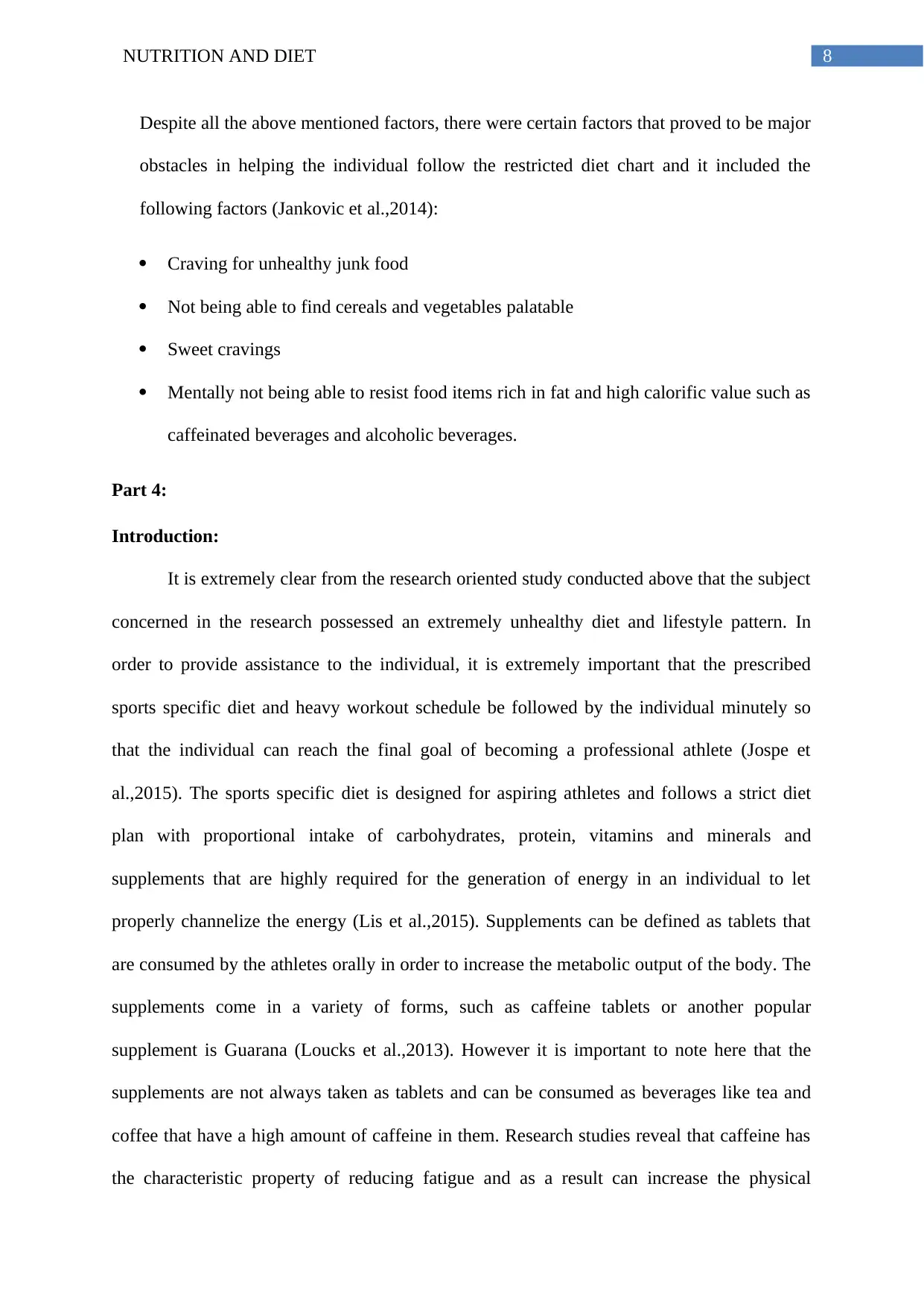
8NUTRITION AND DIET
Despite all the above mentioned factors, there were certain factors that proved to be major
obstacles in helping the individual follow the restricted diet chart and it included the
following factors (Jankovic et al.,2014):
Craving for unhealthy junk food
Not being able to find cereals and vegetables palatable
Sweet cravings
Mentally not being able to resist food items rich in fat and high calorific value such as
caffeinated beverages and alcoholic beverages.
Part 4:
Introduction:
It is extremely clear from the research oriented study conducted above that the subject
concerned in the research possessed an extremely unhealthy diet and lifestyle pattern. In
order to provide assistance to the individual, it is extremely important that the prescribed
sports specific diet and heavy workout schedule be followed by the individual minutely so
that the individual can reach the final goal of becoming a professional athlete (Jospe et
al.,2015). The sports specific diet is designed for aspiring athletes and follows a strict diet
plan with proportional intake of carbohydrates, protein, vitamins and minerals and
supplements that are highly required for the generation of energy in an individual to let
properly channelize the energy (Lis et al.,2015). Supplements can be defined as tablets that
are consumed by the athletes orally in order to increase the metabolic output of the body. The
supplements come in a variety of forms, such as caffeine tablets or another popular
supplement is Guarana (Loucks et al.,2013). However it is important to note here that the
supplements are not always taken as tablets and can be consumed as beverages like tea and
coffee that have a high amount of caffeine in them. Research studies reveal that caffeine has
the characteristic property of reducing fatigue and as a result can increase the physical
Despite all the above mentioned factors, there were certain factors that proved to be major
obstacles in helping the individual follow the restricted diet chart and it included the
following factors (Jankovic et al.,2014):
Craving for unhealthy junk food
Not being able to find cereals and vegetables palatable
Sweet cravings
Mentally not being able to resist food items rich in fat and high calorific value such as
caffeinated beverages and alcoholic beverages.
Part 4:
Introduction:
It is extremely clear from the research oriented study conducted above that the subject
concerned in the research possessed an extremely unhealthy diet and lifestyle pattern. In
order to provide assistance to the individual, it is extremely important that the prescribed
sports specific diet and heavy workout schedule be followed by the individual minutely so
that the individual can reach the final goal of becoming a professional athlete (Jospe et
al.,2015). The sports specific diet is designed for aspiring athletes and follows a strict diet
plan with proportional intake of carbohydrates, protein, vitamins and minerals and
supplements that are highly required for the generation of energy in an individual to let
properly channelize the energy (Lis et al.,2015). Supplements can be defined as tablets that
are consumed by the athletes orally in order to increase the metabolic output of the body. The
supplements come in a variety of forms, such as caffeine tablets or another popular
supplement is Guarana (Loucks et al.,2013). However it is important to note here that the
supplements are not always taken as tablets and can be consumed as beverages like tea and
coffee that have a high amount of caffeine in them. Research studies reveal that caffeine has
the characteristic property of reducing fatigue and as a result can increase the physical
⊘ This is a preview!⊘
Do you want full access?
Subscribe today to unlock all pages.

Trusted by 1+ million students worldwide
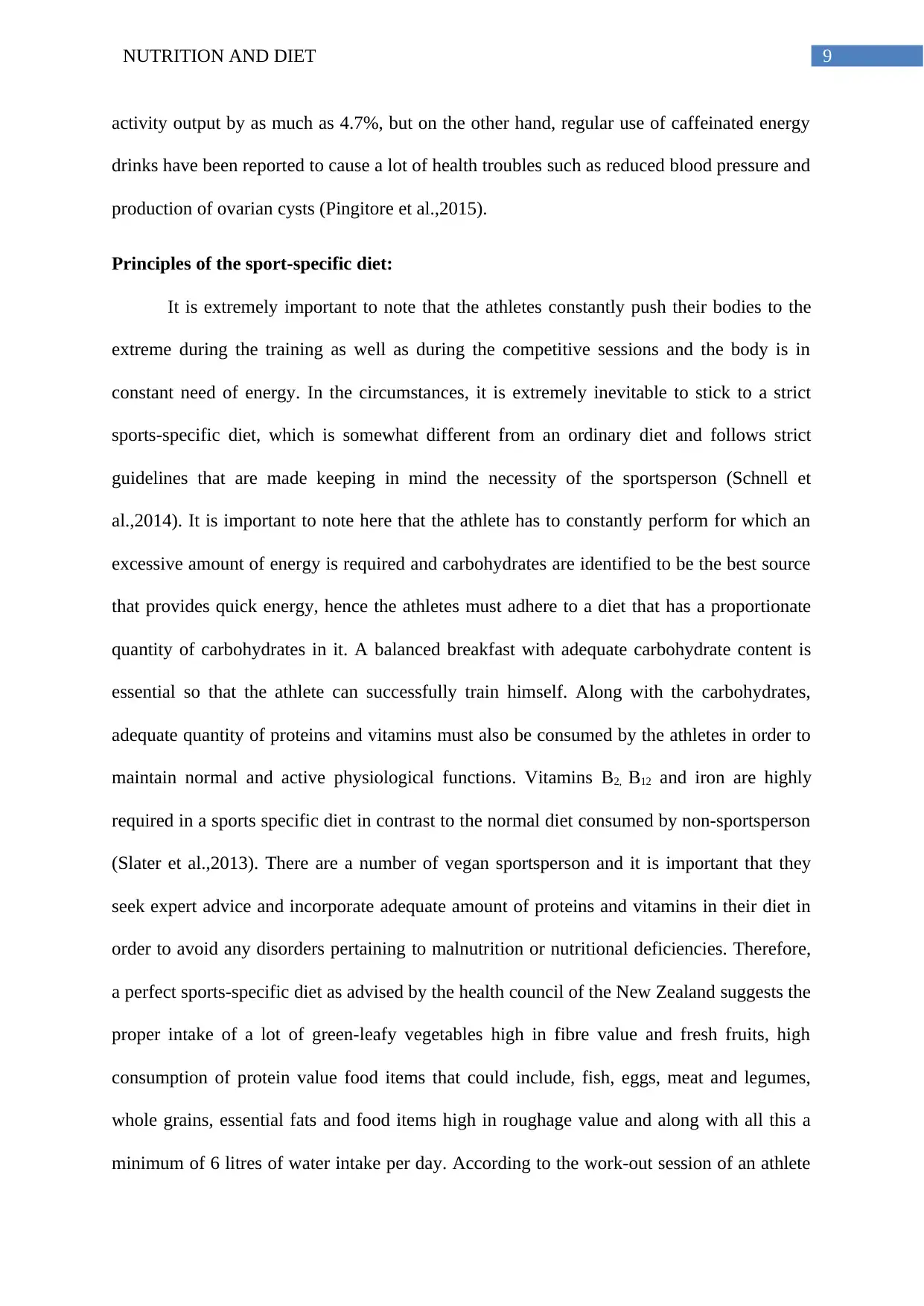
9NUTRITION AND DIET
activity output by as much as 4.7%, but on the other hand, regular use of caffeinated energy
drinks have been reported to cause a lot of health troubles such as reduced blood pressure and
production of ovarian cysts (Pingitore et al.,2015).
Principles of the sport-specific diet:
It is extremely important to note that the athletes constantly push their bodies to the
extreme during the training as well as during the competitive sessions and the body is in
constant need of energy. In the circumstances, it is extremely inevitable to stick to a strict
sports-specific diet, which is somewhat different from an ordinary diet and follows strict
guidelines that are made keeping in mind the necessity of the sportsperson (Schnell et
al.,2014). It is important to note here that the athlete has to constantly perform for which an
excessive amount of energy is required and carbohydrates are identified to be the best source
that provides quick energy, hence the athletes must adhere to a diet that has a proportionate
quantity of carbohydrates in it. A balanced breakfast with adequate carbohydrate content is
essential so that the athlete can successfully train himself. Along with the carbohydrates,
adequate quantity of proteins and vitamins must also be consumed by the athletes in order to
maintain normal and active physiological functions. Vitamins B2, B12 and iron are highly
required in a sports specific diet in contrast to the normal diet consumed by non-sportsperson
(Slater et al.,2013). There are a number of vegan sportsperson and it is important that they
seek expert advice and incorporate adequate amount of proteins and vitamins in their diet in
order to avoid any disorders pertaining to malnutrition or nutritional deficiencies. Therefore,
a perfect sports-specific diet as advised by the health council of the New Zealand suggests the
proper intake of a lot of green-leafy vegetables high in fibre value and fresh fruits, high
consumption of protein value food items that could include, fish, eggs, meat and legumes,
whole grains, essential fats and food items high in roughage value and along with all this a
minimum of 6 litres of water intake per day. According to the work-out session of an athlete
activity output by as much as 4.7%, but on the other hand, regular use of caffeinated energy
drinks have been reported to cause a lot of health troubles such as reduced blood pressure and
production of ovarian cysts (Pingitore et al.,2015).
Principles of the sport-specific diet:
It is extremely important to note that the athletes constantly push their bodies to the
extreme during the training as well as during the competitive sessions and the body is in
constant need of energy. In the circumstances, it is extremely inevitable to stick to a strict
sports-specific diet, which is somewhat different from an ordinary diet and follows strict
guidelines that are made keeping in mind the necessity of the sportsperson (Schnell et
al.,2014). It is important to note here that the athlete has to constantly perform for which an
excessive amount of energy is required and carbohydrates are identified to be the best source
that provides quick energy, hence the athletes must adhere to a diet that has a proportionate
quantity of carbohydrates in it. A balanced breakfast with adequate carbohydrate content is
essential so that the athlete can successfully train himself. Along with the carbohydrates,
adequate quantity of proteins and vitamins must also be consumed by the athletes in order to
maintain normal and active physiological functions. Vitamins B2, B12 and iron are highly
required in a sports specific diet in contrast to the normal diet consumed by non-sportsperson
(Slater et al.,2013). There are a number of vegan sportsperson and it is important that they
seek expert advice and incorporate adequate amount of proteins and vitamins in their diet in
order to avoid any disorders pertaining to malnutrition or nutritional deficiencies. Therefore,
a perfect sports-specific diet as advised by the health council of the New Zealand suggests the
proper intake of a lot of green-leafy vegetables high in fibre value and fresh fruits, high
consumption of protein value food items that could include, fish, eggs, meat and legumes,
whole grains, essential fats and food items high in roughage value and along with all this a
minimum of 6 litres of water intake per day. According to the work-out session of an athlete
Paraphrase This Document
Need a fresh take? Get an instant paraphrase of this document with our AI Paraphraser
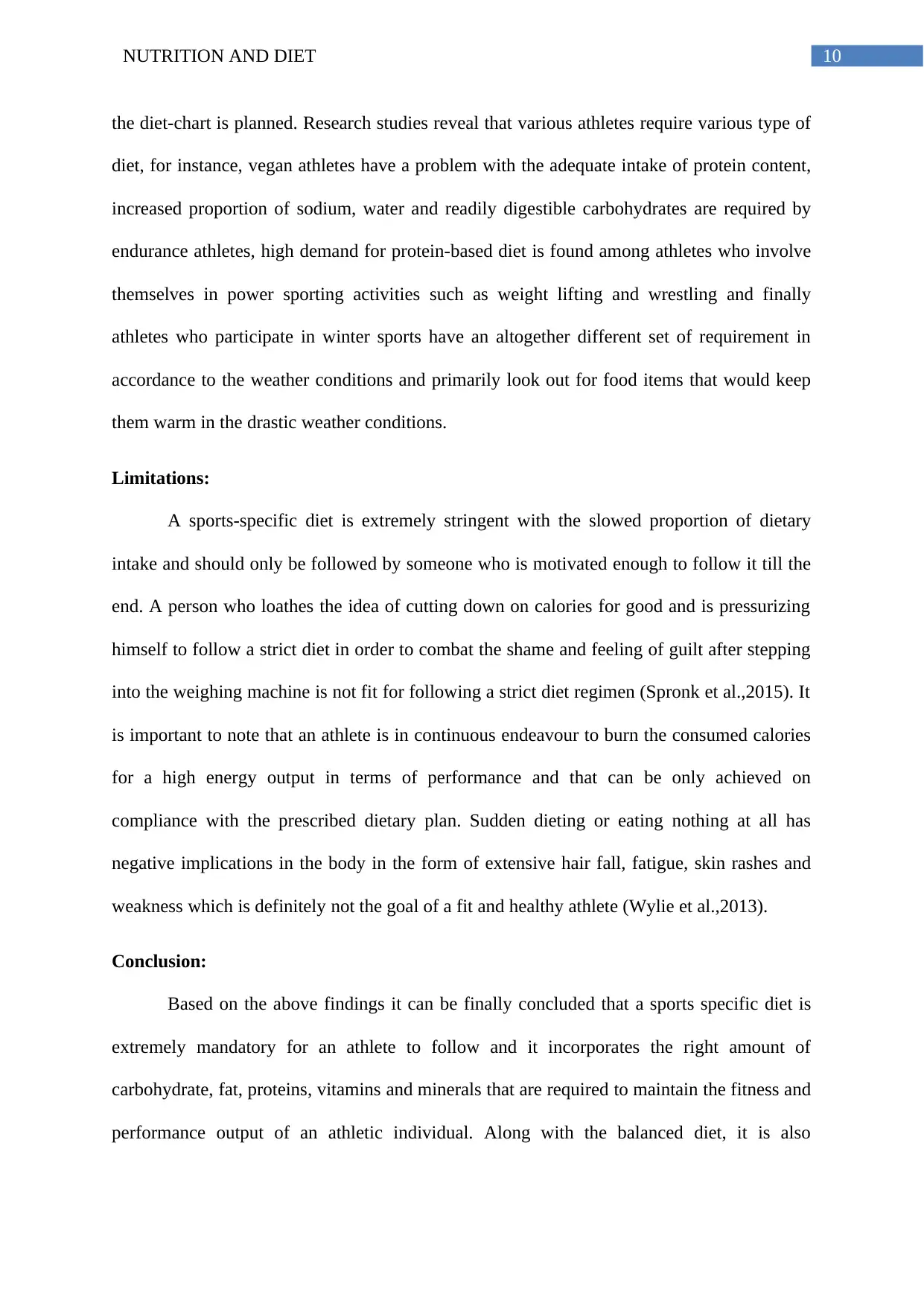
10NUTRITION AND DIET
the diet-chart is planned. Research studies reveal that various athletes require various type of
diet, for instance, vegan athletes have a problem with the adequate intake of protein content,
increased proportion of sodium, water and readily digestible carbohydrates are required by
endurance athletes, high demand for protein-based diet is found among athletes who involve
themselves in power sporting activities such as weight lifting and wrestling and finally
athletes who participate in winter sports have an altogether different set of requirement in
accordance to the weather conditions and primarily look out for food items that would keep
them warm in the drastic weather conditions.
Limitations:
A sports-specific diet is extremely stringent with the slowed proportion of dietary
intake and should only be followed by someone who is motivated enough to follow it till the
end. A person who loathes the idea of cutting down on calories for good and is pressurizing
himself to follow a strict diet in order to combat the shame and feeling of guilt after stepping
into the weighing machine is not fit for following a strict diet regimen (Spronk et al.,2015). It
is important to note that an athlete is in continuous endeavour to burn the consumed calories
for a high energy output in terms of performance and that can be only achieved on
compliance with the prescribed dietary plan. Sudden dieting or eating nothing at all has
negative implications in the body in the form of extensive hair fall, fatigue, skin rashes and
weakness which is definitely not the goal of a fit and healthy athlete (Wylie et al.,2013).
Conclusion:
Based on the above findings it can be finally concluded that a sports specific diet is
extremely mandatory for an athlete to follow and it incorporates the right amount of
carbohydrate, fat, proteins, vitamins and minerals that are required to maintain the fitness and
performance output of an athletic individual. Along with the balanced diet, it is also
the diet-chart is planned. Research studies reveal that various athletes require various type of
diet, for instance, vegan athletes have a problem with the adequate intake of protein content,
increased proportion of sodium, water and readily digestible carbohydrates are required by
endurance athletes, high demand for protein-based diet is found among athletes who involve
themselves in power sporting activities such as weight lifting and wrestling and finally
athletes who participate in winter sports have an altogether different set of requirement in
accordance to the weather conditions and primarily look out for food items that would keep
them warm in the drastic weather conditions.
Limitations:
A sports-specific diet is extremely stringent with the slowed proportion of dietary
intake and should only be followed by someone who is motivated enough to follow it till the
end. A person who loathes the idea of cutting down on calories for good and is pressurizing
himself to follow a strict diet in order to combat the shame and feeling of guilt after stepping
into the weighing machine is not fit for following a strict diet regimen (Spronk et al.,2015). It
is important to note that an athlete is in continuous endeavour to burn the consumed calories
for a high energy output in terms of performance and that can be only achieved on
compliance with the prescribed dietary plan. Sudden dieting or eating nothing at all has
negative implications in the body in the form of extensive hair fall, fatigue, skin rashes and
weakness which is definitely not the goal of a fit and healthy athlete (Wylie et al.,2013).
Conclusion:
Based on the above findings it can be finally concluded that a sports specific diet is
extremely mandatory for an athlete to follow and it incorporates the right amount of
carbohydrate, fat, proteins, vitamins and minerals that are required to maintain the fitness and
performance output of an athletic individual. Along with the balanced diet, it is also
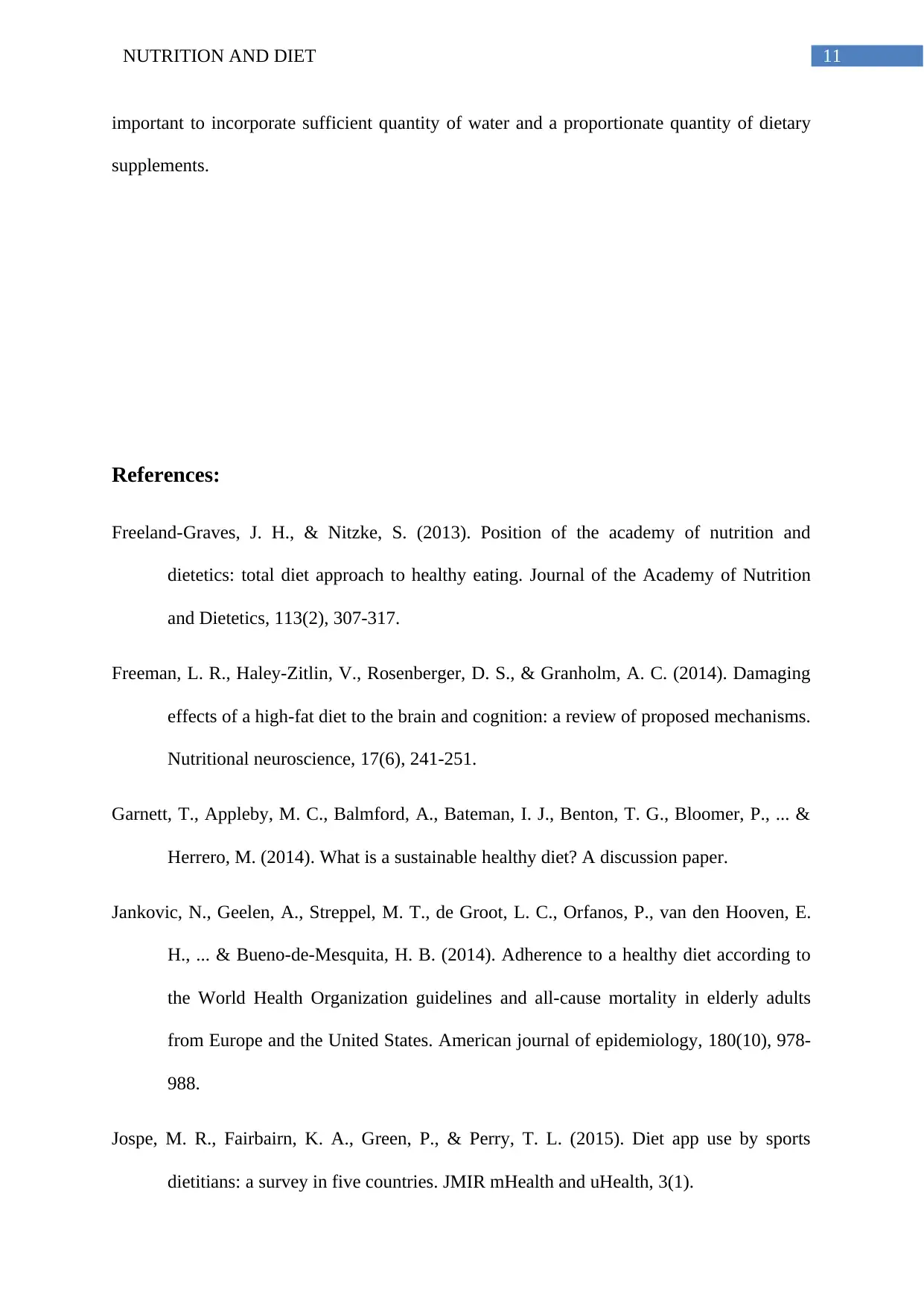
11NUTRITION AND DIET
important to incorporate sufficient quantity of water and a proportionate quantity of dietary
supplements.
References:
Freeland-Graves, J. H., & Nitzke, S. (2013). Position of the academy of nutrition and
dietetics: total diet approach to healthy eating. Journal of the Academy of Nutrition
and Dietetics, 113(2), 307-317.
Freeman, L. R., Haley-Zitlin, V., Rosenberger, D. S., & Granholm, A. C. (2014). Damaging
effects of a high-fat diet to the brain and cognition: a review of proposed mechanisms.
Nutritional neuroscience, 17(6), 241-251.
Garnett, T., Appleby, M. C., Balmford, A., Bateman, I. J., Benton, T. G., Bloomer, P., ... &
Herrero, M. (2014). What is a sustainable healthy diet? A discussion paper.
Jankovic, N., Geelen, A., Streppel, M. T., de Groot, L. C., Orfanos, P., van den Hooven, E.
H., ... & Bueno-de-Mesquita, H. B. (2014). Adherence to a healthy diet according to
the World Health Organization guidelines and all-cause mortality in elderly adults
from Europe and the United States. American journal of epidemiology, 180(10), 978-
988.
Jospe, M. R., Fairbairn, K. A., Green, P., & Perry, T. L. (2015). Diet app use by sports
dietitians: a survey in five countries. JMIR mHealth and uHealth, 3(1).
important to incorporate sufficient quantity of water and a proportionate quantity of dietary
supplements.
References:
Freeland-Graves, J. H., & Nitzke, S. (2013). Position of the academy of nutrition and
dietetics: total diet approach to healthy eating. Journal of the Academy of Nutrition
and Dietetics, 113(2), 307-317.
Freeman, L. R., Haley-Zitlin, V., Rosenberger, D. S., & Granholm, A. C. (2014). Damaging
effects of a high-fat diet to the brain and cognition: a review of proposed mechanisms.
Nutritional neuroscience, 17(6), 241-251.
Garnett, T., Appleby, M. C., Balmford, A., Bateman, I. J., Benton, T. G., Bloomer, P., ... &
Herrero, M. (2014). What is a sustainable healthy diet? A discussion paper.
Jankovic, N., Geelen, A., Streppel, M. T., de Groot, L. C., Orfanos, P., van den Hooven, E.
H., ... & Bueno-de-Mesquita, H. B. (2014). Adherence to a healthy diet according to
the World Health Organization guidelines and all-cause mortality in elderly adults
from Europe and the United States. American journal of epidemiology, 180(10), 978-
988.
Jospe, M. R., Fairbairn, K. A., Green, P., & Perry, T. L. (2015). Diet app use by sports
dietitians: a survey in five countries. JMIR mHealth and uHealth, 3(1).
⊘ This is a preview!⊘
Do you want full access?
Subscribe today to unlock all pages.

Trusted by 1+ million students worldwide
1 out of 13
Related Documents
Your All-in-One AI-Powered Toolkit for Academic Success.
+13062052269
info@desklib.com
Available 24*7 on WhatsApp / Email
![[object Object]](/_next/static/media/star-bottom.7253800d.svg)
Unlock your academic potential
Copyright © 2020–2026 A2Z Services. All Rights Reserved. Developed and managed by ZUCOL.





